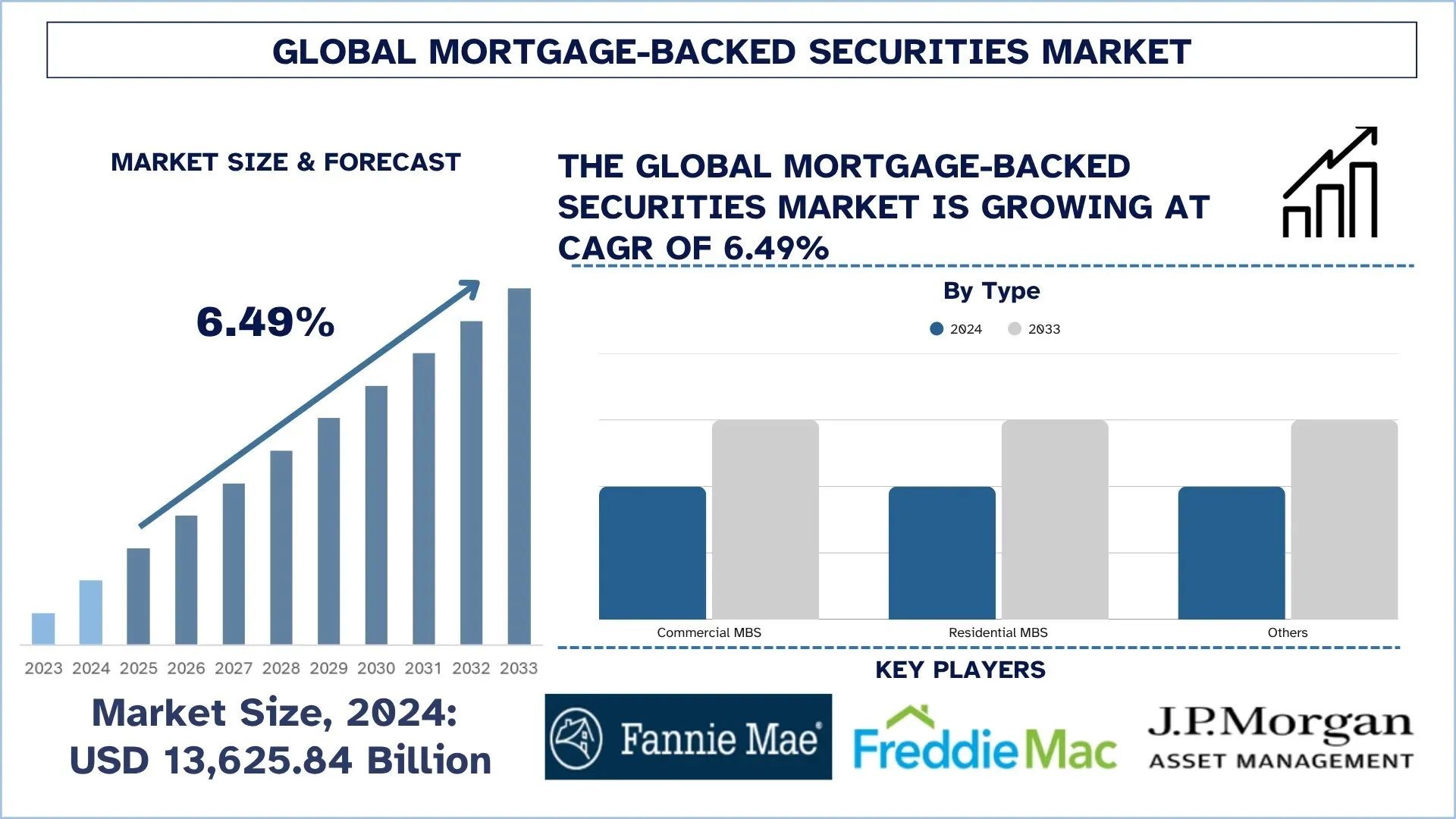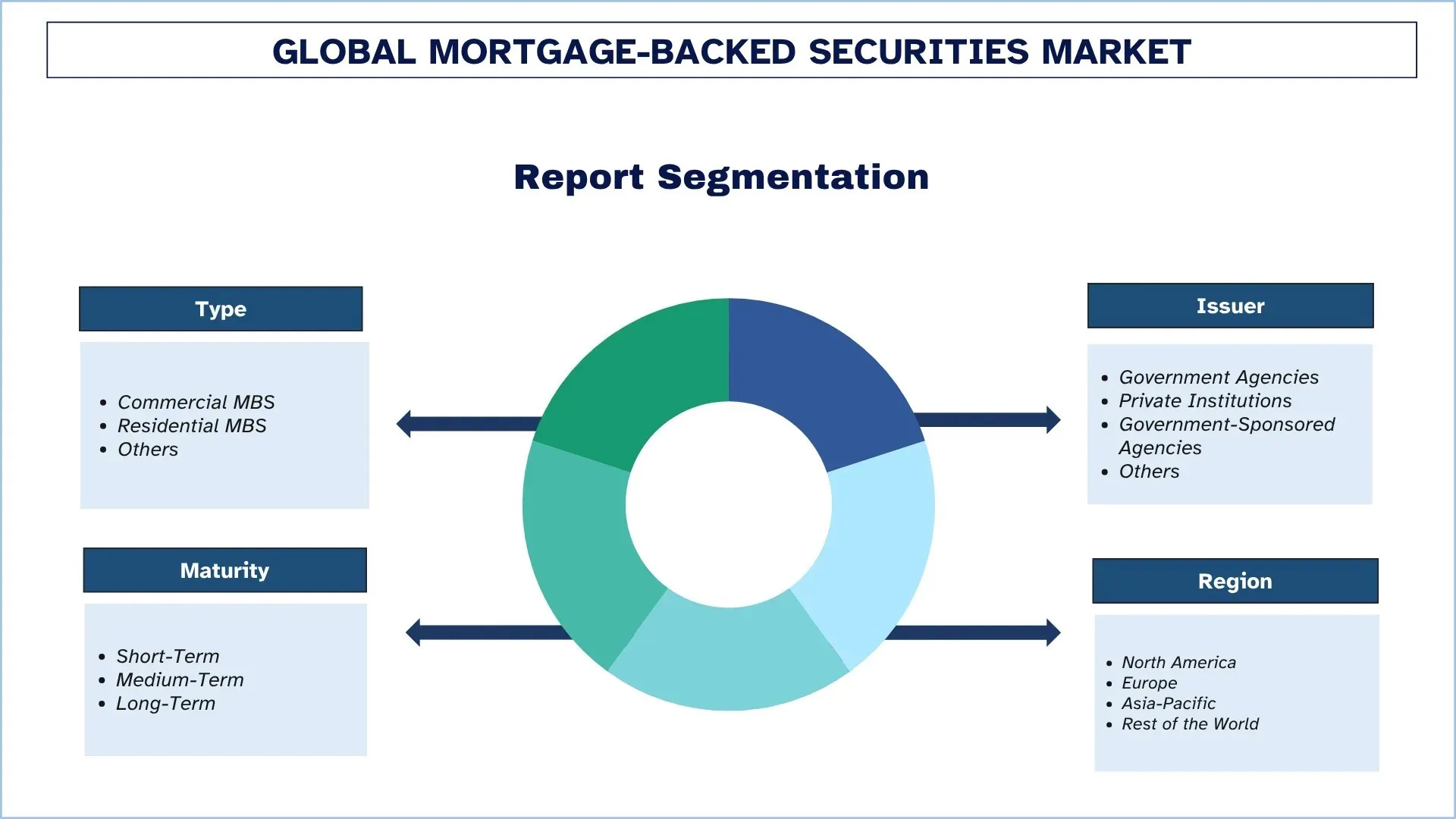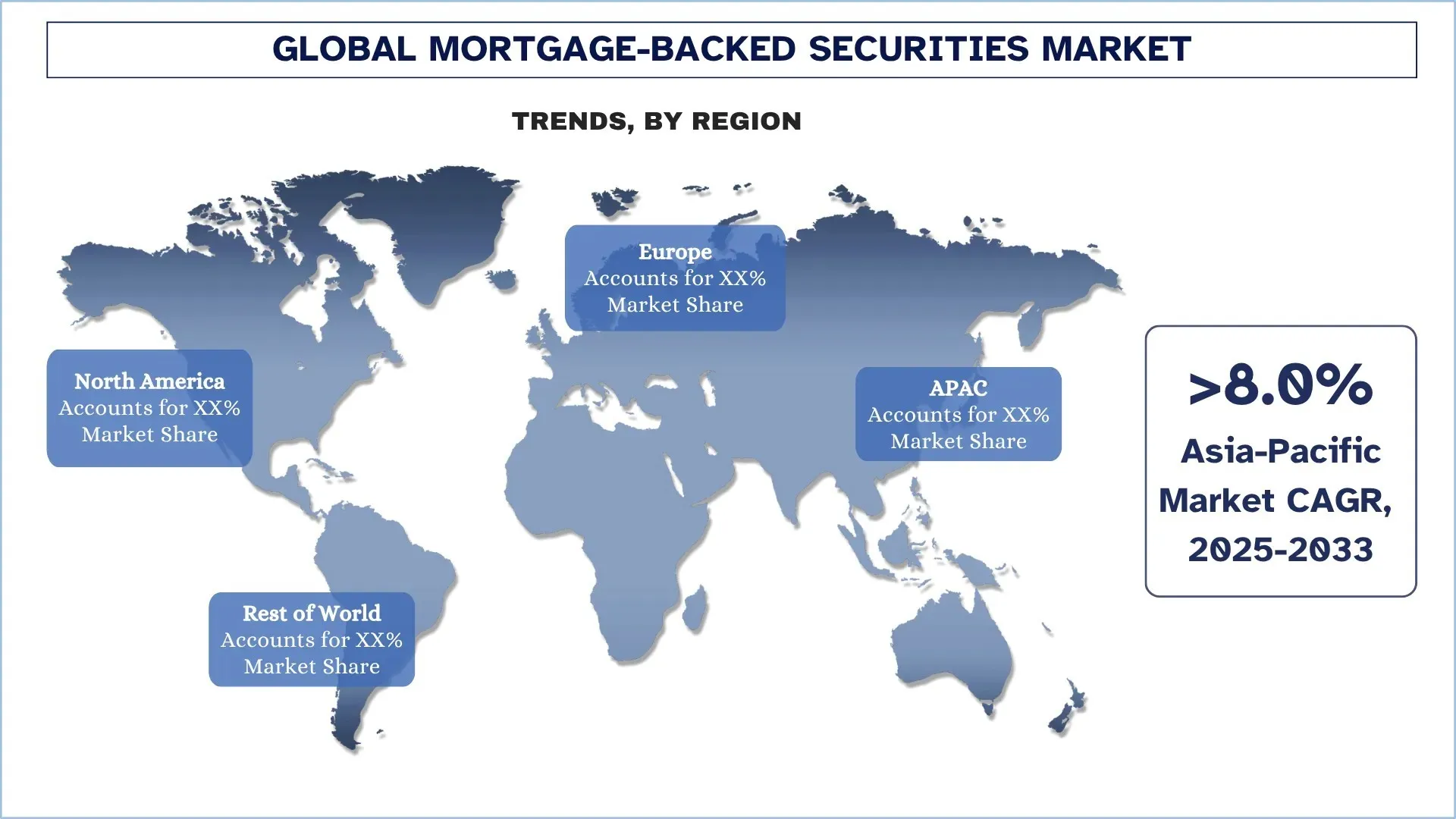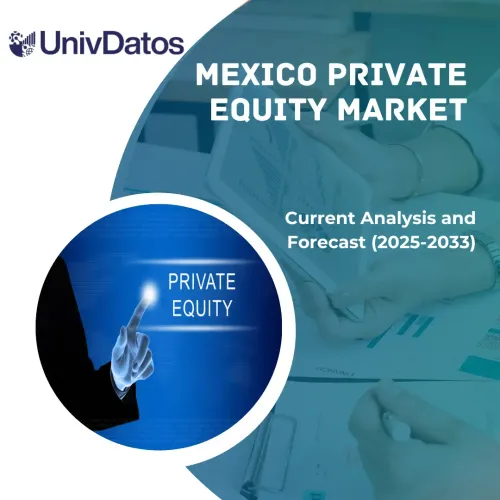- Home
- About Us
- Industry
- Services
- Reading
- Contact Us
Mortgage-Backed Securities Market: Current Analysis and Forecast (2025-2033)
Emphasis on Type (Commercial MBS, Residential MBS, and Others); Maturity (Short-Term, Medium-Term, and Long-Term); Issuer (Government Agencies, Private Institutions, Government-Sponsored Agencies, and Others); and Region/Country

Global Mortgage-Backed Securities Market Size & Forecast
The global mortgage-backed securities market was valued at USD 13,625.84 billion in 2024 and is expected to grow at a strong CAGR of around 6.49% during the forecast period (2025-2033F), driven by the rising investor appetite for stable, income-generating assets and the expansion of securitization frameworks across emerging markets.
Mortgage-Backed Securities Market Analysis
Mortgage-backed securities (MBS) are fixed-income securities that employ mortgage loans as collateral and the source of funds for payments on the security. The creation of MBS begins with a financial institution, such as a bank or credit union, extending a mortgage loan to a borrower. The lender will then pool groups of loans with similar characteristics to create securities themselves or sell the loans to issuers of mortgage-backed securities handle the aggregation of loans and pooling. The loans are sold to a trust, which will be the issuer of the MBS. Once securitized, the MBS can be sold to investors or kept as investments. The mortgage-backed securities (MBS) market is experiencing steady growth due to rising demand for home financing, a supportive government framework, and technological advancements in the financial industry. Growing urbanization and the need for affordable housing are increasing the pool of mortgage loans that can be turned into MBS, providing investors with stable returns. Furthermore, government programs like tax incentives, housing subsidies, and initiatives such as India’s PM Awas Yojana further boost mortgage creation, providing new opportunities to MBS investors, hence driving the growth of the market.
Global Mortgage-Backed Securities Market Trends
This section discusses the key market trends that are influencing the various segments of the global mortgage-backed securities market, as found by our team of research experts.
Emerging Technological Advancements in the Mortgage Sector
Technological advancements in the mortgage sector are one of the key trends of the mortgage-backed securities (MBS) market, promoting efficiency, transparency, and accessibility. The integration of advanced technologies such as artificial intelligence (AI), blockchain, cloud computing, and big data analytics has changed how mortgage loans are originated, processed, and securitized. AI-powered models now allow lenders and investors to assess borrower risk more precisely, forecast prepayment behavior, and manage portfolios in real time. This minimizes the risks and improves the overall performance of MBS, thereby accelerating the growth of the market. Additionally, blockchain technology has improved transparency and security by creating tamper-proof digital ledgers for recording mortgage transactions, minimizing fraud, accelerating loan verification, and allowing faster settlements. Moreover, fintech innovations are also promoting digital mortgage lending, which automates loan applications and credit assessments, shortening approval times and reducing costs. This digital transformation not only increases market participation but also strengthens investor confidence by providing real-time insights into asset quality and cash flow performance.
Mortgage-Backed Securities Industry Segmentation
This section provides an analysis of the key trends in each segment of the global mortgage-backed securities market report, along with forecasts at the global, regional, and country levels for 2025-2033.
The Residential MBS Segment Dominates the Global Mortgage-Backed Securities Market
Based on the type category, the market is categorized into commercial MBS, residential MBS, and others. Among these, the residential MBS segment has the largest market share because of the high volume of home loans and government-backed programs. The government-backed programs offer guarantees that ensure timely payments to investors, reducing credit risk and thus boosting market expansion. However, commercial MBS is exhibiting the fastest growth due to the growth of commercial real estate, including offices, retail centers, warehouses, and industrial properties, which has expanded the volume of commercial loans available. Commercial mortgage-backed securities (CMBS) generally provide a better return rate than residential MBS, attracting investors. Furthermore, innovations such as structured CMBS products with tranches tailored for various risk levels further boost market growth.
The Short-Term Segment Dominates the Global Mortgage-Backed Securities Market.
Based on the maturity category, the market is categorized into short-term, medium-term, and long-term. Among these, the short-term segment dominates the market share due to lower risk and greater liquidity. Investors frequently prefer short-term bonds as they offer quicker principal repayment and faster access to funds, reducing the credit risk and high interest rate. In addition, short-term bonds are more liquid and attractive to investors looking for predictable cash flows, especially when interest rates fluctuate, thereby driving the market growth. However, the long-term segment is experiencing the fastest growth due to rising demand for long-duration home loans. Investors are also looking for bonds that offer higher return rates, thereby driving the growth of the market.

North America holds the largest market share in the global mortgage-backed securities market
The North American dominated the global mortgage-backed securities (MBS) market due to its well-established financial infrastructure, robust institutional frameworks, and deep capital markets, making it a hub for MBS issuance and investment. Banks and financial institutions across regions offer robust loan plans, services, and securitization capability, enabling large volumes of mortgage loans to be turned into tradable asset securities, driving the growth of the market. Furthermore, government policies and regulatory frameworks across the region promote liquidity, investor protection, and risk management, which further strengthen the region's position in the market. Moreover, the involvement of institutional investors, pension funds, and insurance companies guarantees high liquidity, making MBS easily tradable and attracting global participation. Technological progress, including digital mortgage platforms, automated servicing systems, and data analytics, improves efficiency, risk management, and operational effectiveness, fueling the growth of the market.
The U.S. held a Dominant share of the North America Mortgage-Backed Securities Market in 2024
The United States dominated the North American mortgage-backed securities market because of high issuance and investment activity, a strong housing finance system, and government involvement. Government-sponsored enterprises (GSEs) like Fannie Mae, Freddie Mac, and Ginnie Mae play essential roles in issuing MBS, enhancing transparency for investors, and supporting market growth. Furthermore, rising homeownership rates, increasing demand for housing finance, and a large pool of conforming and government-backed loans continue to fuel market expansion. The country's advanced capital markets facilitate large-scale trading of MBS, attracting institutional investors such as pension funds, insurance companies, and asset managers, which further speeds up market growth.

Mortgage-Backed Securities Industry Competitive Landscape
The global Mortgage-backed securities market is competitive, with several global and international market players. The key players are adopting different growth strategies to enhance their market presence, such as partnerships, agreements, collaborations, geographical expansions, and mergers and acquisitions.
Top Mortgage-Backed Securities Market Companies
Some of the major players in the market are Fannie Mae, Freddie Mac, JPMorgan Chase & Co., Ginnie Mae, Wells Fargo & Company, Bank of America, Goldman Sachs, Morgan Stanley, Deutsche Bank AG, and Royal Bank of Canada.
Recent Developments in the Mortgage-Backed Securities Market
In August 2025, the Saudi Real Estate Refinance Company (SRC), a subsidiary of the Public Investment Fund, launched Saudi Arabia’s first residential mortgage-backed securities (RMBS) transaction. This transaction aims to improve liquidity in the housing finance sector and broaden investment opportunities by transforming residential mortgage loans into tradable securities.
In May 2025, India's first mortgage-backed Pass-Through Certificates (PTCs) structured by RMBS Development Company Limited were listed on the National Stock Exchange, marking a significant development in the country's housing finance sector. This initiative aims to integrate the housing finance market with the debt market to improve liquidity and investor participation, thereby driving the growth of the mortgage-backed securities market in India.
Global Mortgage-Backed Securities Market Report Coverage
Report Attribute | Details |
Base year | 2024 |
Forecast period | 2025-2033 |
Growth momentum | Accelerate at a CAGR of 6.49% |
Market size 2024 | USD 13,625.84 billion |
Regional analysis | North America, Europe, APAC, Rest of the World |
Major contributing region | The North America region is expected to dominate the market during the forecast period. |
Key countries covered | U.S., Canada, Germany, U.K., Spain, Italy, France, China, Japan, and India. |
Companies profiled | Fannie Mae, Freddie Mac, JPMorgan Chase & Co., Ginnie Mae, Wells Fargo & Company, Bank of America, Goldman Sachs, Morgan Stanley, Deutsche Bank AG, and Royal Bank of Canada |
Report Scope | Market Trends, Drivers, and Restraints; Revenue Estimation and Forecast; Segmentation Analysis; Demand and Supply Side Analysis; Competitive Landscape; Company Profiling |
Segments Covered | By Type, By Maturity, By Issuer, and By Region/Country |
Reasons to Buy the Mortgage-Backed Securities Market Report:
The study includes market sizing and forecasting analysis confirmed by authenticated key industry experts.
The report briefly reviews overall industry performance at a glance.
The report covers an in-depth analysis of prominent industry peers, primarily focusing on key business financials, type portfolios, expansion strategies, and recent developments.
Detailed examination of drivers, restraints, key trends, and opportunities prevailing in the industry.
The study comprehensively covers the market across different segments.
Deep dive regional level analysis of the industry.
Customization Options:
The global mortgage-backed securities market can further be customized as per the requirements or any other market segment. Besides this, UnivDatos understands that you may have your own business needs; hence, feel free to contact us to get a report that completely suits your requirements.
Table of Content
Research Methodology for the Global Mortgage-Backed Securities Market Analysis (2023-2033)
We analyzed the historical market, estimated the current market, and forecasted the future market of the global mortgage-backed securities market to assess its application in major regions worldwide. We conducted exhaustive secondary research to gather historical market data and estimate the current market size. To validate these insights, we carefully reviewed numerous findings and assumptions. Additionally, we conducted in-depth primary interviews with industry experts across the mortgage-backed securities value chain. After validating market figures through these interviews, we used both top-down and bottom-up approaches to forecast the overall market size. We then employed market breakdown and data triangulation methods to estimate and analyze the market size of industry segments and sub-segments.
Market Engineering
We employed the data triangulation technique to finalize the overall market estimation and derive precise statistical numbers for each segment and sub-segment of the global mortgage-backed securities market. We split the data into several segments and sub-segments by analyzing various parameters and trends, including type, maturity, issuer, and regions within the global mortgage-backed securities market.
The Main Objective of the Global Mortgage-Backed Securities Market Study
The study identifies current and future trends in the global mortgage-backed securities market, providing strategic insights for investors. It highlights regional market attractiveness, enabling industry participants to tap into untapped markets and gain a first-mover advantage. Other quantitative goals of the studies include:
Market Size Analysis: Assess the current and forecast market size of the global mortgage-backed securities market and its segments in terms of value (USD).
Mortgage-Backed Securities Market Segmentation: Segments in the study include areas of type, maturity, issuer, and region.
Regulatory Framework & Value Chain Analysis: Examine the regulatory framework, value chain, customer behavior, and competitive landscape of the mortgage-backed securities industry.
Regional Analysis: Conduct a detailed regional analysis for key areas such as Asia Pacific, Europe, North America, and the Rest of the World.
Company Profiles & Growth Strategies: Company profiles of the mortgage-backed securities market and the growth strategies adopted by the market players to sustain the fast-growing market.
Frequently Asked Questions FAQs
Q1: What is the global mortgage-backed securities market’s current market size and growth potential?
As of 2024, the global mortgage-backed securities market is valued at USD 13,625.84 billion and is projected to grow at an impressive CAGR of 6.49% from 2025 to 2033, reflecting strong growth potential in housing finance and investment sectors.
Q2: Which segment has the largest share of the global mortgage-backed securities market by type category?
The residential MBS segment holds the largest share of the global mortgage-backed securities market, driven by increasing home financing and investment demand in residential properties.
Q3: What are the driving factors for the growth of the global mortgage-backed securities market?
Top growth drivers of the mortgage-backed securities market include:
• Rising demand for portfolio diversification, as investors seek stable, predictable returns.
• Increasing government support for housing finance, including policies and programs that promote mortgage lending and securitization.
• Expansion of secondary mortgage markets, which improves liquidity and market efficiency for mortgage-backed securities.
Q4: What are the emerging technologies and trends in the global mortgage-backed securities market?
Emerging trends in the mortgage-backed securities market include:
• Technological advancements in mortgage origination, servicing, and securitization, streamlining processes and reducing costs.
• Adoption of advanced analytics and AI-driven underwriting, enhancing risk management and operational efficiency.
• Growing focus on digital platforms for mortgage trading and real-time portfolio monitoring, making the market more transparent and accessible to investors.
Q5: What are the key challenges in the global mortgage-backed securities market?
Key challenges in the mortgage-backed securities market include:
• Interest rate fluctuations, which can impact MBS valuations.
• Prepayment risk, where borrowers pay off mortgages early, affects expected returns for the investor.
Q6: Which region dominates the global mortgage-backed securities market?
North America dominates the global mortgage-backed securities market, supported by a mature housing finance system, well-established capital markets, and strong investor demand.
Q7: Who are the key competitors in the global mortgage-backed securities market?
Top players in the mortgage-backed securities industry include:
• Fannie Mae
• Freddie Mac
• JPMorgan Chase & Co.
• Ginnie Mae
• Wells Fargo & Company
• Bank of America
• Goldman Sachs
• Morgan Stanley
• Deutsche Bank AG
• Royal Bank of Canada
Q8: What are the investment opportunities in the global mortgage-backed securities (MBS) market?
The global MBS market offers diverse investment opportunities, including residential and commercial MBS, tailored portfolios for risk-adjusted returns, and exposure to regions with high housing demand. Institutional investors and asset managers can leverage these instruments to enhance portfolio stability and yield.
Q9: How do regulatory changes impact the mortgage-backed securities market?
Regulatory policies on mortgage lending, securitization standards, and risk retention directly influence the MBS market. Businesses and investors need to monitor central bank interest rate policies, housing finance reforms, and global compliance standards to mitigate risks and capitalize on growth opportunities.
Related Reports
Customers who bought this item also bought










